(金版学案)Unit1-Great-scientists Using-Language
【金版新学案】(陕西专用)2015届高考英语大一轮复习 Unit 1 Great scientist
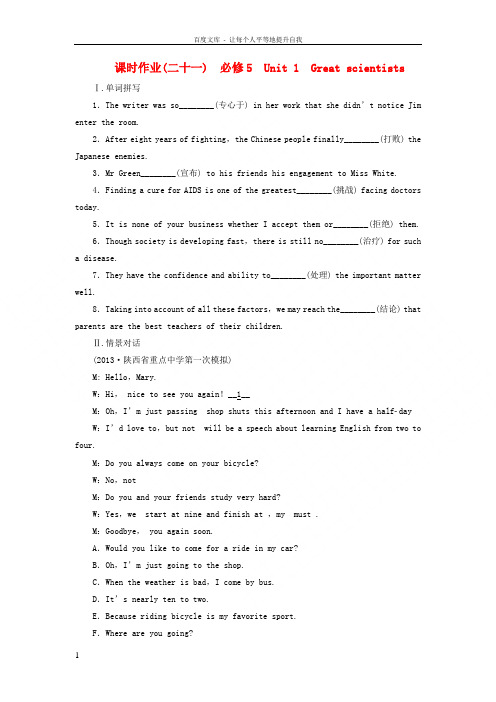
课时作业(二十一) 必修5 Unit 1 Great scientists Ⅰ.单词拼写1.The writer was so________(专心于) in her work that she didn’t notice Jim enter the room.2.After eight years of fighting,the Chinese people finally________(打败) the Japanese enemies.3.Mr Green________(宣布) to his friends his engagement to Miss White.4.Finding a cure for AIDS is one of the greatest________(挑战) facing doctors today.5.It is none of your business whether I accept them or________(拒绝) them.6.Though society is developing fast,there is still no________(治疗) for such a disease.7.They have the confidence and ability to________(处理) the important matter well.8.Taking into account of all these factors,we may reach the________(结论) that parents are the best teachers of their children.Ⅱ.情景对话(2013·陕西省重点中学第一次模拟)M: Hello,Mary.W:Hi, nice to see you again!__1__M:Oh,I’m just passing shop shuts this afternoon and I have a halfday W:I’d love to,but not will be a speech about learning English from two to four.M:Do you always come on your bicycle?W:No,notM:Do you and your friends study very hard?W:Yes,we start at nine and finish at ,my must .M:Goodbye, you again soon.A.Would you like to come for a ride in my car?B.Oh,I’m just going to the shop.C.When the weather is bad,I come by bus.D.It’s nearly ten t o two.E.Because riding bicycle is my favorite sport.F.Where are you going?G.I’m going to school.Ⅲ.单项填空1.(2014·龙岩四校联考)—Would you like to join us in the game?—________,for I have something important to attend to.A.I will B.I’d love toC.I won’t D.I’m afraid not2.(2014·沈阳六校联合诊断)As far as I know,Mark is a(n)________shopper who always does some careful research on the market before he buys something valuable.A.fortunate B.generousC.enthusiastic D.cautious3.(2014·武汉名校调研)Finding information in today’s world is ________is how you can tell if the information you get is useful or not.A.knowledge B.abilityC.competition D.challenge4.(2014·云南毕业班质检)After further studying those fossils,Dubois,a Swiss scientist,announced with________that the socalled “Java Man” was merely an extinct monkey.A.courage B.certaintyC.anxiety D.relief5.(2014·厦门毕业班适应性考试)Graduation,in________opinion of many students,is________time to thank those who helped them through.A.the;a B.the;/C.a;a D./;the6.(2014·福建省普通高中质量检查)It is said that sixty percent of all energy________in the world today is being lost as wasted heat.A.produced B.producingC.to produce D.having produced7.(2014·洛阳高三第一次统考)When he came back three hours later,they were still sitting on the sofa,________in conversation.A.absorbing B.absorbedC.to absorb D.to be absorbed8.(2014·河南师大附中高三质检)—Who________for the shooting at a movie theatre in America?—A gunman named James Eagan Holmes.A.is to blame B.has blamedC.is blaming D.is to be blamed9.(2014·泰安质量检测)Don’t be so you________such feelings,you will do better next time.A.carry on B.get backC.break down D.put away10.(2014·南京一模)Only when you take great delight in reading and begin reading good books________the pleasure of reading.A.do you B.you tasteC.you will taste D.will you taste11.On Christmas Eve,there were so many customers that the shop assistants couldn’t ________them all.A.apply to B.appeal toC.attend to D.commit to12.(2014·银川一中月考)His composition was so confusing that I could hardly make any________of it.A.meaning B.messageC.sense D.information13.(2011·福建卷)________good service,the restaurant offers different kinds of traditional Fujian dishes.A.Far from B.Apart fromC.Instead of D.Regardless of14.John applied to several companies after he resigned his position as vice president,but he was________over and over again.A.rejected B.resistedC.relied D.reacted15.Children________to difficult situations are better at handling those________tasks.A.exposing;challenging B.exposed;challengedC.exposed;challenging D.exposing;challengedⅣ.完形填空[建议用时15′](2014·江西八校联考)We always want what we cannot we’re young,we want to stay out late,have romantic relationships and ,when we’re__2__,we want to go back to being youngand we__3__the days when we didn’t have to worry about complex love affairs,__4__pressure and money problems.Young people believe adulthood__5__freedom from parents and they get older,they feel that__6__is freedom from work pressure and family feeling,people say,“The grass is always__8__on the other side of the fence.”As__9__,we like to be like adults but as young adults,we __10__to be young think about staying out late and__11__our own money to ,we see that love can result in __12__hearts;staying out late makes it hard to get ready for__13__the next find our that adult life is not as__14__as we thought it would be and suddenly,__15__becomes very scary.Life gives us time to__17__but also requires us to time will come when we must grow up and we will always look back wishing we__18__being young a bit time will not come is normal to want what we cannot have but the__19__is that to be happy is to appreciate what we is the first step to grow becomes more complex,we will not regret the time we wasted wishing we were adults.B.dependentC.polite D.independent2.B.olderC.married D.confident3.B.forgetC.miss D.regret4.B.studyC.age D.health5.B.showsC.limits D.means6.B.childhoodC.parenthood D.neighborhood7.B.experienceC.describe D.understand8.B.greenerC.yellow D.colorful9.B.adultsC.teenagers D.elders10.B.wishC.return D.stop11.B.worrying aboutC.having D.showing off12.B.ambitiousC.excited D.broken13.B.schoolC.work D.exercise14.B.busyC.poor D.easy15.B.lifeC.career D.future16.B.fairC.short D.beautiful17.B.thinkC.live D.play18.B.imaginedC.enjoyed D.tried19.B.resultC.truth D.dream20.B.IfC.Unless D.BeforeⅤ.阅读理解(2014·吉林省长春市高中毕业班第二次调研测试)3D cinema has been around since the early 20th century,but Hollywood brought the technology back in thought it was just a trick to make more then came Avatar,the first mustsee movie in 3D.But since Avatar,3D cinema has ,several_3D_movies by late 2010,some people said the technology was course,this isn’t the first time Hollywood has struggled with new sound was added to movies in the late 1920s,it took audience time to get used to the new in the end,sound and color became the Cameron,director of Avatar,thinks we’re going through the same process with 3D.Some say cinemas are charging too much for 3D the US,seeing a 3D movie can cost up to $ more than seeing it in ,a recent study at California State University have found audience don’t actually enjoy movies in 3D any more than in Murch,a famous movie editor,wrote in 2011 that human beings have no ability to process 3D a 3D movie confuses our brain and this is why some people get headaches.But James Cameron fact,he recently predicted that in five years all movies will be in there are signs that 3D is fighting 3D movies were put on the market in 2012 than ever Lion King3D recently made over $150 million at the box office,and Cameron’s Titanic 3D made even more.Who knows what the future holds for 3D?Steven Spielberg recently said,“ I’m hoping 3D gets to a point where people don’t notice it because then it just becomes another tool and helps tell a story.”1.The underlined sentence in Paragraph 2 probably means that in 2010,3D movies________.A.were not successful B.became popularC.developed quickly D.were of poor quality2.The example of sound and color is used mainly to show that________.A.Hollywood tends to absorb what is newB.3D technology takes time to be acceptedC.Hollywood struggles with new technologyD.high technology helps to make better movies3.In Walter Murch’s opinion,3D movies________.A.bring movie makers great profitsB.are more expensive than 2D moviesC.do great harm to people’s healthD.are unsuitable for people to watch4.What can we learn from the text?A.Avatar was the first 3D movie.B.3D cinema has existed for years.C.Titanic 3D has made the most money.D.2012 witnessed the coming of 3D’s time.课时作业(二十一)Ⅰ.单词拼写1.absorbedⅡ.情景对话1.FⅢ.单项填空1.解析:考查交际用语。
高中英语真题-Unit1GreatScientists(第三课时)教案

高中英语真题:Unit1GreatScientists (第三课时)教案教学内容This is the fifth period, whichwill center on the grammar: using the past participle as the attribute and the predicative. To learn about the past participle used as the attribute and the predicative.To know the differences between the past participle and the present participle.教学目标Knowledge Aim To learn about the past partici ple used as the attribute and t he predicative. Ability Aim To use the past participle used as the attribute and the predictive freely and properly in sp eaking and writing.Emotional AimsEncourage the students learn more about the grammar. Help the students to form the good habit in learning.Encourage the students to domore exercises to consolidate their knowledge.教学策略手段At the beginning of this period, the teacher should give the students some time to go overwhat they learned in the last p eriod.Later the teacher had better present some sentences containing the past participle used as the attribute and the predicative on purpose by asking thestudents to do some exercises.After finding them, the teacher can ask the students to analy ze them and understand the f unction of the past participle i n those sentences.After that t he teacher should give the stu dents clear explanations abou t the usage of the grammar. After mastering the rules of th e past participle, the students should be given more exercis es to consolidate what they le arn.Besides that, the teacher sho uld help the students to revie w the other usages of the past participle.In the end, let them write a passage using the pas t participle properly.Apart from the usage of the p ast participle, the teacher had better make the students und erstand the differences between the past participle and thepresent participle.课堂练习Past Participle as the AttributePast Participle as the Predicative 1.terrified people 2.reserved seats 3.polluted water 4.a crowded room5.a pleased winner6. 7. 8. 9.10. 1. 2. 3. 4. 5. 6.children who look a stonished 7.a vase that is brok en 8.a door that is close d 9.the audience who f eel tired 10.an animal that is t rapped 2、Now look at the screen.Finish the exercises quickly.1.He got__________ about losi ng the money.2.Why do you always look so __________?Do you sleep well these days?3.I was__________ with the fil m I saw last night.I had expec ted it to be better.4.Everybody was__________ t o hear the death of the famou s film star.5.The children are really_____ _____ about going to the zoo.6.His wound became________ __ with a new virus.3、Further PractisingT: Now let’s do some exercise s.1.The Olympic Games, __________(play) in 776 B.C., did n ot include women players until 1912.2.Cleaning women in big citie s get __________ (pay) by the hour.3.Most of the people ________ __ (invite)to the party didn’t tur n up because of the heavy rai n.4.Who is the man __________ (talk)to our headmaster?5.The professor __________ ( pay) a visit to our school is fro m Beijing University.6.The__________ (die) man w as immediately taken to hospi tal.7.The soldiers got off the truc k and moved the __________ ( fall) tree away from the high w ay.8.We __________ (surprise) tofind that few of the students d id the experiment well.教学反思Unit1GreatScientists (第三课时)教案教学内容This is the fifth period, which will center on the grammar: using the past participle as the attribute and the predicative.To learn about the past participle used as the attribute and the predicative. To know the differences between the past pa rticiple and the present participle.教学目标 Knowledge AimTo learn about the past participle used as theattribute and the predicative. Ability AimTo use the past participle used as the attribute and the predictive freely and properly in sp eaking and writing.Emotional AimsEncourage the students learn more about the grammar.Help the students to form the good habit in le arning.Encourage the students to do more exercises to consolidate their knowledge.教学策略手段At the beginning of this period, the teacher sh ould give the students some time to go over what they learned in the last period.Later the teacher had better present some se ntences containing the past participle used a s the attribute and the predicative on purpose by asking the students to do some exercises .After finding them, the teacher can ask the st udents to analyze them and understand the f unction of the past participle in those sentenc es.After that the teacher should give the stud ents clear explanations about the usage of th e grammar.After mastering the rules of the past participle , the students should be given more exercise s to consolidate what they learn.Besides that, the teacher should help the stu dents to review the other usages of the past participle.In the end, let them write a passage using the past participle properly.Apart from the usage of the past participle, th e teacher had better make the students unde rstand the differences between the past parti ciple and the present participle.课堂Past Participle as the Attribute Past Participle as the Predicativ练习e1.terrified people2.reserved seats3.polluted water4.a crowded room5.a pleased winner6.7.8.9.10.1.2.3.4.5.6.children who look astonished7.a vase that is broken8.a door that is closed9.the audience who feel tired10.an animal that is trapped2、Now look at the screen.Finish the exercises q uickly.1.He got__________ about losing the money.2.Why do you always look so __________?Do you sleep well these days?3.I was__________ with the film I saw last nig ht.I had expected it to be better.4.Everybody was__________ to hear the death of the famous film star.5.The children are really__________ about goi ng to the zoo.6.His wound became__________ with a new v irus.3、Further PractisingT: Now let’s do some exercises.1.The Olympic Games, __________(play) in 776 B.C., did not include women players until1912.2.Cleaning women in big cities get _________ _ (pay) by the hour.3.Most of the people __________ (invite)to the party didn’t turn up because of the heavy rai n.4.Who is the man __________ (talk)to our hea dmaster?5.The professor __________ (pay) a visit to o ur school is from Beijing University.6.The__________ (die) man was immediately taken to hospital.7.The soldiers got off the truck and moved the __________ (fall) tree away from the high w ay.8.We __________ (surprise) to find that few of the students did the experiment well.教学反思。
Unit1GreatScientists教案

Unit 1 Great ScientistsTopic: Great ScientistsFunctions: Learn to talk about great scientists.Learn to talk about contributions of great scientists.Learn to talk about stages in setting out a new scientific idea.Target language: What do you know about great scientists?Do you know how to prove a new idea in scientific research?What do you know about infectious disease?What do you know about cholera?What kind of scientific job do you want to do?Period 1 Warming upTeaching goals:1. To talk about some great scientists and their achievements. Promote the Ss to know something. about great scientists.2. Learn some new words and expressions.3. To examine a new scientific idea.Teaching procedures:Step 1 Greeting and Lead-inT: I’m very glad to see you all here. After a long holiday, all of you look energetic and happy. I hope that we will work hard together happily all through the year. I do believe that a bright future is waiting for you. We are sure to realize our dreams in the near future.1. What would you like to be in the future?2. Do you want to be a scientist in the future?3. Which scientists do you know?Show two videos about Steven Hawking.Step 2 QuizDo the quiz, connecting the famous scientist with his contributions.Alexander Bell electricityThomas Edison the First telephoneWright Brothers the electric LampMadame Curie black holes in UniverseFranklin Theory of GravitySteven Hawking the First PlaneElbert Einstein RadiumIsaac Newton the Theory of RelativityStep3 What other scientists do you know?Show other great scientists referred to in our textbook.1) Archimedes (287—212 BC) Ancient Greek. He was a mathematician. He found that if you put an object into water the water pushes the object up. It rises and partly floats.“Give me a place to stand on, and I can move the earth.” ----Archimedes2) Charles Darwin (1808-1882) British naturalist. The Origin of Species was published in 1859. It explained how plants and animals had changed over time to fit in with a changing environment. His book showed that people had developed from apes.3)Thomas Newcomen Thomas Newcomen, British (1663--1729) He improved the first steam pump built by Thomas Savery in 1698 and turned it into a steam engine for taking water out of mines in 1712. James Watt improved it still further in the 1770s4) Gregor Mendel (1822—1884), Czech. The father of genetic. He grew pea plants and developed ideas on heredity (遗传) and inherited characteristics. Between 1856—1863 he grew 28,000 pea plants. He examined seven kinds of seed and plant characteristics and developed some laws of inheritance.5) Leonardo da Vinci (Italian) (1452-1519) He was a famous Italian artist whose skill for showing human skin tones made his paintings seem to come alive. He used to study dead people in order to make his paintings as accurate as possible. Some of his famous paintings include “The Adoration of the Magi” and the “The Last Supper”. Later in his life he lived in France where he designed a submarine (潜水艇) and a flying machine.6) Humphry Davy British. He did research into different gases and discovered the medical value of nitrous oxide (laughing gas) as an anaesthetic. (麻醉药) In 1815 he developed a safety lamp for miners.7) Zhang Heng, Chinese ( 78-----139) He invented the first seismograph to indicate in the direction of an earthquake. It was in the shape of a cylinder with eight dragonheads round the top, each with a ball in its mouth. Around the bottom were eight frogs directly under a dragon’s head. When an earthquake occurred, a ball fell out of the dragon’s mouth, making a noise.Step 4 SummaryDraw a conclusion: They allmade a great contributionmade great achievementssucceeded in their scientific careerovercome many difficultiesStep 5 Discussion1 (Group Competition)Topic 1: What can you learn from these scientists?Topic 2: What qualities should we have to be a successful man?(Give the students several minutes to have a discussion. Then let them have a group competition.)Step 6 Show the picture of Zhong Nanshan (钟南山) to lead in a question.Do you know how to prove a new idea in scientific research?Step6 Discussion2 (Group Competition)Stages in setting out a new scientific idea:Draw a conclusionThink of a methodCollect resultsMake a questionFind a problemAnalyze the resultsFind supporting evidenceStep 7 HomeworkT: In this period, we have talked a lot about great scientists. You have a lot of previous knowledge and you are full of imagination and creativity. Those scientists set good examples to us. And I think all of us are happy about learning more of them. After class, it’s better to read some books about them and you can surf the Internet to get more information.1. Write a composition “ What I can learn from________”(name of a great scientist).2. Memorize stages in setting out a new scientific idea.Period 2 Reading ComprehensionTeaching aims:Let the Ss learn the reading skill of understanding reading materials.Teaching procedures:Step1. Fast readingScanning:Who was the great scientist in the passage and what was the deadly disease of its day?Introduce John Snow and the disease: choleraT: How did John Snow defeat it?Skimming:Read quickly and silently to find answers to the following 7 questions.1. What happened in 1854?2. How many people died in 10 days?3. Why is there no death at No. 20 and 21 Broad Street as well as at No. 8 and 9 Cambridge Street?4. Why couldn’t the cholera be under control at first?5. Which theory did John Snow believe in?6. John Snow finally proved the theory he believed by ________.A. gathering information with the help of a mapB. looking into the source of the water for Broad Street and Cambridge StreetC. separating those who suffered cholera from those who didn’tD. both A and B7. To prevent the cholera from spreading again, what did John Snow do?Step2. Detailed reading2. Draw a conclusion3. Discussion1Finish quickly part 1 in the page 3 by working together.Period 3 Reading & ListeningTeaching aims:1. Master some important words and sentences.2. Enable the Ss to learn how to organize a scientific research.3. Learn from the great scientist John Snow.Step11. Read the first paragraph aloud and think how famous John Snow was?Fill the blanks while listening to the first paragraph.(1)John Snow was a famous doctor in London– so expert, indeed, that he attended Queen Victoria as her personal physician.① expertn.专家,能手She is a reputable expert.她是个有声望的专家。
金版学案2014年Unit1 Great scientists Writing

栏 目 链 接
栏 目 链 接
栏 目 链 接
答案:Every time we discussed the plans to develop our city, Mr.Li neither put forward any suggestions, nor did he make any comment on others' ideas.But Mr.Wang always suggested that we should develop our economy first, saying only when/only if we had enough money could we do other things well.
Unit 1
Great scientists
Writing
第五学时
栏 目 链 接
栏 目 链 接
►即学即练
neither
nor neither the witness nor the policeman
栏 目 链 接
栏 目 链 接
栏 目 链 接
►即学即练
Every time I saw him
栏 目 链 接
every time/
each time I wa►即学即练
Only when you told me did I know Only if will you be
栏 目 链 接
栏 目 链 接
栏 目 链 接
栏 目 链 接
答案: John Snow Born on 15 March,1813 in England, John Snow is considered to be one of the fathers of epidemiology. As we know, he was a British physician and a leader in the adoption of anaesthesia and medical hygiene. As he majored in epidemiology, he succeeded in defeating King Cholera which broke out in London in 1854. At the age of 26, he began working at the Westminster Hospital and in 1844 he graduated from the University of London. Unfortunately, he passed away on June 16, 1858.
Unit 1 Great Scientists教案
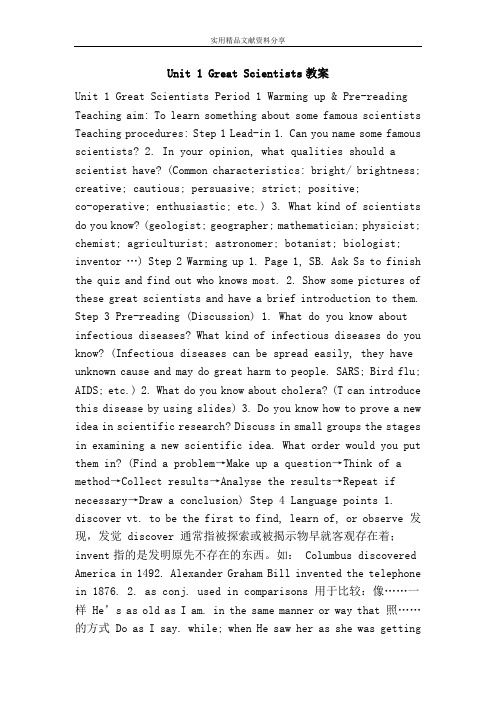
Unit 1 Great Scientists教案Unit 1 Great Scientists Period 1 Warming up & Pre-reading Teaching aim: To learn something about some famous scientists Teaching procedures: Step 1 Lead-in 1. Can you name some famous scientists? 2. In your opinion, what qualities should a scientist have? (Common characteristics: bright/ brightness; creative; cautious; persuasive; strict; positive;co-operative; enthusiastic; etc.) 3. What kind of scientists do you know? (geologist; geographer; mathematician; physicist; chemist; agriculturist; astronomer; botanist; biologist; inventor …) Step 2 Warmin g up 1. Page 1, SB. Ask Ss to finish the quiz and find out who knows most. 2. Show some pictures of these great scientists and have a brief introduction to them. Step 3 Pre-reading (Discussion) 1. What do you know about infectious diseases? What kind of infectious diseases do you know? (Infectious diseases can be spread easily, they have unknown cause and may do great harm to people. SARS; Bird flu; AIDS; etc.) 2. What do you know about cholera? (T can introduce this disease by using slides) 3. Do you know how to prove a new idea in scientific research? Discuss in small groups the stages in examining a new scientific idea. What order would you put them in? (Find a problem→Make up a question→Think of a method→Collect results→Analyse the results→Repeat if nece ssary→Draw a conclusion) Step 4 Language points 1. discover vt. to be the first to find, learn of, or observe 发现,发觉 discover 通常指被探索或被揭示物早就客观存在着;invent指的是发明原先不存在的东西。
新课标unit1Great Scientists整套教案The 1st Period(新课标版高二英
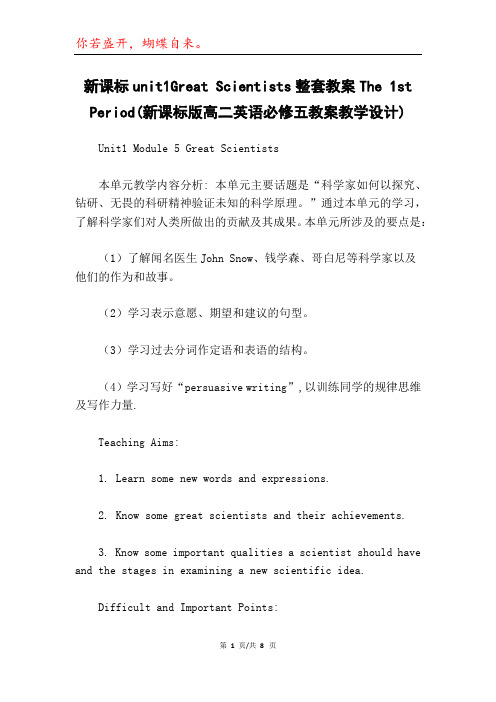
新课标unit1Great Scientists整套教案The 1st Period(新课标版高二英语必修五教案教学设计)Unit1 Module 5 Great Scientists本单元教学内容分析: 本单元主要话题是“科学家如何以探究、钻研、无畏的科研精神验证未知的科学原理。
”通过本单元的学习,了解科学家们对人类所做出的贡献及其成果。
本单元所涉及的要点是:(1)了解闻名医生John Snow、钱学森、哥白尼等科学家以及他们的作为和故事。
(2)学习表示意愿、期望和建议的句型。
(3)学习过去分词作定语和表语的结构。
(4)学习写好“persuasive writing”,以训练同学的规律思维及写作力量.Teaching Aims:1. Learn some new words and expressions.2. Know some great scientists and their achievements.3. Know some important qualities a scientist should have and the stages in examining a new scientific idea.Difficult and Important Points:1)Word study2)Discuss in groups the stages in examining a new scientific idea.Teaching Methods:1. Inductive method2. Pair work group work3. Word Study according to the situations given (Do exercises)Teaching Procedures:Step I Warming up1. What do you know about great scientists?Try this quiz and find out who knows the most.(Pair work to finish the Quiz Questions on P1.)2.Check the answers with the whole class.1).Archimedes (an ancient Greek mathematician physicist)2).Charles Darwin (British, author of The Origin of Species )3).Thomas Newcomen (British, improved the first steam pumpand turned it into a steam engine for taking water out of mines in 1712 .James Watt improved it and turned it into the first modern steam engine used on the railways. )4).Gregor Mendel (Czech)5).Marie Curie (Polish and French, won two Nobel Prizes)6).Thomas Edison (an American inventor)7).Leonardo da Vinci (a famous Italian artist)8).Sir Humphry Davy (British)9).Zhang Heng (Chinese, invented seismograph)10).Stephen Hawking (a British astronomer)Step II. Word Study1.Read the new words after the tape.2.Choose the correct words to complete the following sentences.1) John Snow devoted himself to ________(science, scientific) research.2) He worked hard until he drew a ____________(conclude, conclusion) in 1854.3) The boy needs one more stamp to make his collection__________ (complete, completely)4) ____________(Apart from, Except) that 10 dollars, I have another ten given by my mother.5) Cholera was a ________disease. Many people _____ of it. (dead, die , death, deadly)6) People who had drunk the __________ (polluting, polluted) water were dead.7) I will tell him the good news ____________ I see him. (immediate, immediately)8) I suggest _______(to have, having) a rest after working for such a longtime.3. Choose the correct words or expressions to fill in the blanks. Each word or expression may be used only once.1.Who _______________ a theory about black holes?2.What ______________ did you draw?3.The car went out of ___________ and crashed.4.SARS is a terrible _____________ disease.5.He _____________ a difficult argument skillfully.6.The cholera outbreak was so ________ that more than 500 people had died in 10 days.7. Everyone was silent as he ___________ the winner of the match.8._____________ visiting the zoo, we went to the museum.Step III. Practice (using inductive method)Use the correct form of the words to fill in the blanks.Infectionexamination=examScience /scientistConcludeAnalysisDefeatValueannouncement /announcerInstructionCalculatecontribution /contributor contributive Instructor/instructionMoveRejectionCreateCompletionPersuader Persuaden. adj. adv.Certain certainlyco-operation XRevolution XPrivacy隐私;隐居 PrivateX backwardEnthusiasm enthusiasticallyLogic logicallyStep IV. Pre-readingDiscussion:1.What five most important qualities do you think a scientist should have? Give the reasons.generous clever strict patient creative strong-willed serious intelligent honest ambitious talented careful2. Do you know how to prove a new idea in scientific research? Discuss in groups the stages in examining a new scientific idea. What order would you put them in?Draw a conclusion Think of a method Collect results Make up a question Find a problem Analyse the results Repeat if necessaryAfter reading the following passage, put the correct stages into the reading about research into a disease.Step V. SummaryStep VI. Homework Assignment1.Read the passage John Snow Defeats “King Cholera”.2. Learn the new words by heart and prepare for tomorrow’s dictation.文档内容到此结束,欢迎大家下载、修改、丰富并分享给更多有需要的人。
【知识学习】Unit 1 Great Scientists教案

Unit 1 Great Scientists教案Unit1GreatScientistsPeriod1warmingup&Pre-readingTeachingaim:TolearnsomethingaboutsomefamousscientistsTeachingprocedures:Step1Lead-in.canyounamesomefamousscientists?2.Inyouropinion,whatqualitiesshouldascientisthave?3.whatkindofscientistsdoyouknow?Step2warmingup.Page1,SB.AskSstofinishthequizandfindoutwhoknow smost.2.Showsomepicturesofthesegreatscientistsandhaveabri efintroductiontothem.Step3Pre-reading.whatdoyouknowaboutinfectiousdiseases?whatkindo finfectiousdiseasesdoyouknow?2.whatdoyouknowaboutcholera?3.Doyouknowhowtoproveanewideainscientificresearch?D iscussinsmallgroupsthestagesinexamininganewscientif icidea.whatorderwouldyouputthemin?Step4Languagepoints.discovervt.tobethefirsttofind,learnof,orobserve发现,发觉discover通常指被探索或被揭示物早就客观存在着;invent指的是发明原先不存在的东西。
如:columbusdiscoveredAmericain1492.AlexanderGrahamBillinventedthetelephonein1876.2.asconj.usedincomparisons用于比较:像……一样He’sasoldasIam.inthesamemannerorwaythat照……的方式DoasIsay.while;whenHesawherasshewasgettingoffthebus.becauseAsshehasnocar,shecan’tgetthereeasily.thoughTiredasIwas,Itriedtohelpthem.asitis:inreality;infact事实上Ihopethingswouldgetbetter,butasitistheyaregettingwo rse.asitwere:sotospeak;inacertainway可以说;跟……一样Heismybestfriend,mybrother,asitwere.3.characteristicn.aspecialandeasilyrecognizedqualityofsomeoneorsome thing特色,特性Acharacteristicofthisanimalisitsabilitytoliveforalo ngtimewithoutwater.adj.typical;representingaperson’sorthing’susualcharacter独特的Iheardmyfriend’scharacteristicvoice.4.thewayofdoingsth.意为“做……的方法”,还可以表达为thewaytodo。
高中英语《Unit 1 Great scientists》优质课教案、教学设计
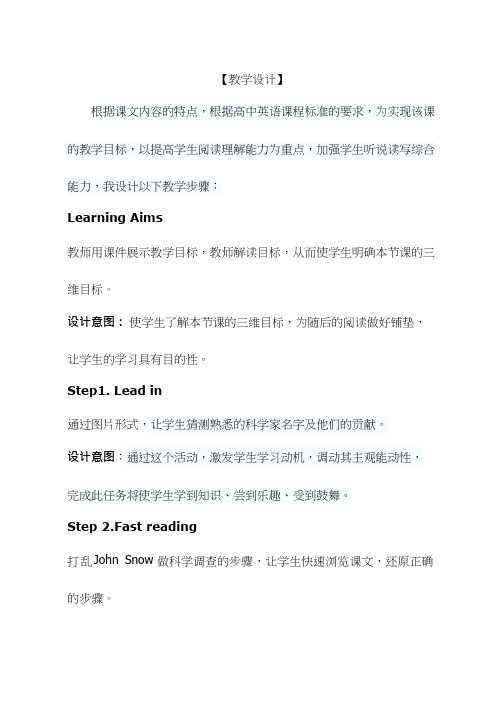
【教学设计】根据课文内容的特点,根据高中英语课程标准的要求,为实现该课的教学目标,以提高学生阅读理解能力为重点,加强学生听说读写综合能力,我设计以下教学步骤:Learning Aims教师用课件展示教学目标,教师解读目标,从而使学生明确本节课的三维目标。
设计意图:使学生了解本节课的三维目标,为随后的阅读做好铺垫,让学生的学习具有目的性。
Step1. Lead in通过图片形式,让学生猜测熟悉的科学家名字及他们的贡献。
设计意图:通过这个活动,激发学生学习动机,调动其主观能动性,完成此任务将使学生学到知识、尝到乐趣、受到鼓舞。
Step 2.Fast reading打乱John Snow 做科学调查的步骤,让学生快速浏览课文,还原正确的步骤。
设计意图:学生快速阅读,把握每段的大致意思和主旨大意,目的是使学生掌握快速阅读的技巧。
Step 3.Careful Reading1.学生分段阅读课文,找出一些详细信息,更深入地理解课文,回答针对每个段落所提出的问题,为之后的归纳总结与复述打下基础。
2.让学生针对本环节的任务(在学案上)逐一阅读段落,搜寻答案。
3.对John Snow 分析的地图详细理解,并在课件中呈现地图图片,并让学生了解并解释当时的霍乱分布情况及产生的原因。
设计意图:通过再次阅读,充分理解课文,并把握文中的细节,能够有效地培养学生自主学习的能力,并进一步加深对科学研究的步骤和措施。
Step 4. Presentation通过课本中提供的地图,让学生在理解课文后自己组织语言,描述通过地图John Snow 是如何研究霍乱,以及是如何得出结论的。
设计意图:通过学生上台阐述地图的内容等,让学生真正理解并完成课文中实验步骤的梳理,同时提高学生口语表达能力。
Step 5 .Group work and Discussion“W h y d i d t h e a u th o r u se‘d e f ea t’i n th e t i tl e,a n d w h at sh ou l d you do when you meet with difficulties?”小组合作,讨论交流,并由组长调动组内成员积极发言,并汇集整理观点。
(金版学案)Unit1-Great-scientists-Writing

栏 目 链 接
every time/
栏 目 链 接
►即学即练
栏
目
Only when you told me
链
接
did I know
Only if
will you be
栏 目 链 接
栏 目 链 接
答案:Every time we discussed the plans to develop our city, Mr.Li neither put forward any suggestions, nor did he make any comment on others' ideas.But Mr.Wang always suggested that we should develop our economy first, saying only when/only if we had enough money could we do other things well.
栏 目 链 接
栏 目 链 接
栏 目 链 接
栏 目 链 接
答案:
John Snow
Born on 15 March,1813 in England, John Snow is
considered to be one of the fathers of
epidemiology. As we know, he was a British
栏
physician and a leader in the adoption of
目
anaesthesia and medical hygiene. As he majored
链 接
in epidemiology, he succeeded in defeating King
Unit 1 Great scientists教学设计
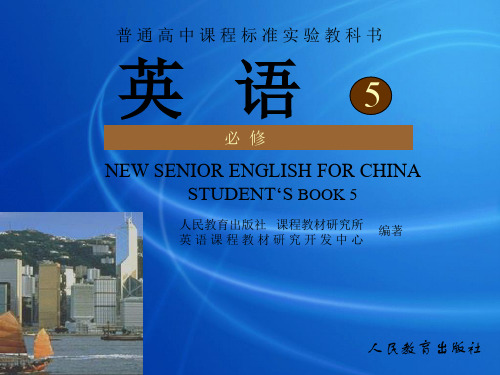
三、本单元教学建议
语言应用(Using language)部分这部分是对多种语言技 能的综合运用。Listening & speaking要求学生预习听力内 容。听力的部分通过两个学生谈论科学家钱学森的故事, 帮助学生了解科学家的生活经历。通过回答5个问题,训 练学生分析解决问题能力。建议学生在听的过程中记一些 重要的单词即可。从听力中就可引出speaking部分,教师 可通过简单的问答来激发学生说的欲望,可以在几个简单 问答后,补充课文中有用的表达,让学生讨论将来职业的 选择。在培养学生交际能力的同时,教师要不失时机进行 德育渗透,教育学生应树立远大理想,并为实现自己的理 想而奋斗。
三、本单元教学建议
小结(Summing up)部分,这部分用以提高学生的认知 水平,通过对本单元内容和知识点的回顾,查漏补缺,培 养学生概括总结能力。教师应及时发现学生在这几个方面 的不足,并给予适当辅导。
学习建议(Learning up)部分,这部分是指导学生写好 劝说文,以训练学生逻辑guage中writing部分时,引入这个学习内 容。
三、本单元教学建议
Reading & writing部分的阅读材料讲述了哥白尼是如何建 立太阳中心学说的。在进行整体阅读后,如有必要,教师 可以用问题形式启示讲解文中语言知识点和部分难句。通 过Exercise 1,让学生比较哥白尼理论和前人理论的不同, 培养学生的观察和比较能力。Exercise 2运用发散性思维 阐明自己的观点。Writing要求学生根据阅读内容给哥白 尼写一封信,建议他尽快公布他的发现。教师应告诉学生 写这类文章的注意事项,例如:文章结构应为:表达你的 想法——陈述理由——提出建议。可以让学生课后搜集、 整理信息后再写。
一、教学内容分析
Unit 1 Great Scientists教学设计

Unit 1 Great Scientists教学设计I went to see a doctor and he gave me some medicine。
Do you know who discovered penicillin。
the first tic。
(Teacher asks for students' answers and gives some background n on Alexander Fleming)学生活动XXX.XXX教师活动T: Now。
let's read the passage about great XXX the students to read it carefully)学生活动XXX.Practice教师活动T: Please work in groups of three or four and discuss XXX the passage)学生活动XXX.n教师活动T: Now。
let's summarize what we have learned today。
Please write down three things you have learned from this passage。
(Teacher gives some time for students to write down their summaries)学生活动XXX.Assessment教师活动T: Please hand in your summaries。
I will check them andgive you XXX' understanding of the passage)学生活动XXX.Scientific Report: Examining a New IdeaStep 1: Quick ReadingPara 1: Identifying the ProblemThe first XXX the problem。
高二英语必修五《Unit 1 Great scientists》教案
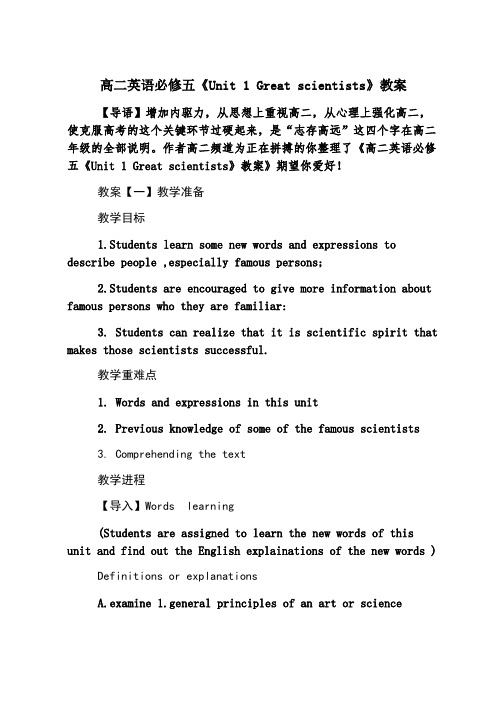
高二英语必修五《Unit 1 Great scientists》教案【导语】增加内驱力,从思想上重视高二,从心理上强化高二,使克服高考的这个关键环节过硬起来,是“志存高远”这四个字在高二年级的全部说明。
作者高二频道为正在拼搏的你整理了《高二英语必修五《Unit 1 Great scientists》教案》期望你爱好!教案【一】教学准备教学目标1.Students learn some new words and expressions to describe people ,especially famous persons;2.Students are encouraged to give more information about famous persons who they are familiar:3. Students can realize that it is scientific spirit that makes those scientists successful.教学重难点1. Words and expressions in this unit2. Previous knowledge of some of the famous scientists3. Comprehending the text教学进程【导入】Words learning(Students are assigned to learn the new words of thisunit and find out the English explainations of the new words )Definitions or explanationsA.examine 1.general principles of an art or scienceB.repeat 2.say or do againC.theory 3.at once; without delayD.immediate 4.look at...carefully in order to learn about or from...EXplete 5.of great value, worth or useF.valuable 6.having all its parts; whole; finishedG.announce 7.make knownH.control 8Xe or bring to an endI.positive 9.power to order or directJ.conclude 10.quite certain or sure【讲授】useful sentences learning(The sentences are picked from the text.)1.“All roads lead to Rome, ”he encouraged me after I failed the entrance examination.2.This sentence doesn’t make any sense.3.Our English teacher is not only strict with us but also friendly to us.4.He is good-looking, apart from his nose.5.It is announced that the spacecraft, Shenzhou Ⅵ, landed on the earth successfully.6.It is not Tom but you who are to blame.7.In 1995, the Chinese government put forward a planfor“rejuvenating the nation by relying on science andeducation”.And it has helped Chinese scientists make many breakthroughs.8.Have you drawn any conclusion after you read this passage?9.Well done.So much for the learning of the new words and expressions.【讲授】Introduction of a classic articleTeacher introduce a famous person --Qian Xuesen and students learn to write an article about the famous scientis using the words and expressions they just learn in class.【活动】Share the outcomeStudents share their article orally and discuss whether they have used some good and advanced expressions.【练习】Consolidation完成句子(1)爱因斯坦被认为是二十世纪最伟大的科学家之一。
【教育学习文章】Unit 1 Great Scientists教案

Unit 1 Great Scientists教案Unit1GreatScientistsPeriod1warmingup&Pre-readingTeachingaim:TolearnsomethingaboutsomefamousscientistsTeachingprocedures:Step1Lead-in.canyounamesomefamousscientists?2.Inyouropinion,whatqualitiesshouldascientisthave?3.whatkindofscientistsdoyouknow?Step2warmingup.Page1,SB.AskSstofinishthequizandfindoutwhoknow smost.2.Showsomepicturesofthesegreatscientistsandhaveabri efintroductiontothem.Step3Pre-reading.whatdoyouknowaboutinfectiousdiseases?whatkindo finfectiousdiseasesdoyouknow?2.whatdoyouknowaboutcholera?3.Doyouknowhowtoproveanewideainscientificresearch?D iscussinsmallgroupsthestagesinexamininganewscientif icidea.whatorderwouldyouputthemin?Step4Languagepoints.discovervt.tobethefirsttofind,learnof,orobserve发现,发觉discover通常指被探索或被揭示物早就客观存在着;invent指的是发明原先不存在的东西。
如:columbusdiscoveredAmericain1492.AlexanderGrahamBillinventedthetelephonein1876.2.asconj.usedincomparisons用于比较:像……一样He’sasoldasIam.inthesamemannerorwaythat照……的方式DoasIsay.while;whenHesawherasshewasgettingoffthebus.becauseAsshehasnocar,shecan’tgetthereeasily.thoughTiredasIwas,Itriedtohelpthem.asitis:inreality;infact事实上Ihopethingswouldgetbetter,butasitistheyaregettingwo rse.asitwere:sotospeak;inacertainway可以说;跟……一样Heismybestfriend,mybrother,asitwere.3.characteristicn.aspecialandeasilyrecognizedqualityofsomeoneorsome thing特色,特性Acharacteristicofthisanimalisitsabilitytoliveforalo ngtimewithoutwater.adj.typical;representingaperson’sorthing’susualcharacter独特的Iheardmyfriend’scharacteristicvoice.4.thewayofdoingsth.意为“做……的方法”,还可以表达为thewaytodo。
(新课标陕西专版)《金版新学案》2011高考英语一轮复习 Unit 1 Great scientists随堂检测 必修5
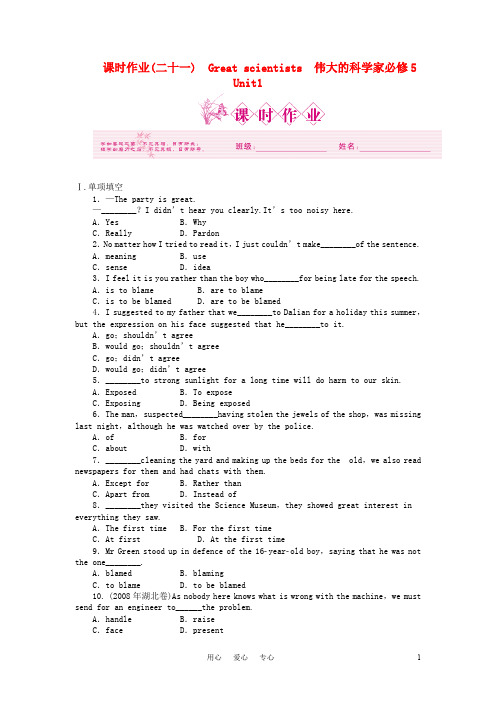
课时作业(二十一) Great scientists 伟大的科学家必修5Unit1Ⅰ.单项填空1.—The party is great.—________?I didn’t hear you clearly.It’s too noisy here.A.Yes B.WhyC.Really D.Pardon2.No matter how I tried to read it,I just couldn’t make________of the sentence.A.meaning B.useC.sense D.idea3.I feel it is you rather than the boy who________for being late for the speech.A.is to blame B.are to blameC.is to be blamed D.are to be blamed4.I suggested to my father that we________to Dalian for a holiday this summer,but the expression on his face suggested that he________to it.A.go;shouldn’t agreeB.would go;shouldn’t agreeC.go;didn’t agreeD.would go;didn’t agree5.________to strong sunlight for a long time will do harm to our skin.A.Exposed B.To exposeC.Exposing D.Being exposed6.The man,suspected________having stolen the jewels of the shop,was missing last night,although he was watched over by the police.A.of B.forC.about D.with7.________cleaning the yard and making up the beds for the old,we also read newspapers for them and had chats with them.A.Except for B.Rather thanC.Apart from D.Instead of8.________they visited the Science Museum,they showed great interest in everything they saw.A.The first time B.For the first timeC.At first D.At the first time9.Mr Green stood up in defence of the 16yearold boy,saying that he was not the one________.A.blamed B.blamingC.to blame D.to be blamed10. (2008年湖北卷)As nobody here knows what is wrong with the machine,we must send for an engineer to______the problem.A.handle B.raiseC.face D.present11.________in his test papers,he didn’t notice my coming.A.Having absorbed B.AbsorbedC.Absorbing D.Being absorbed12.—Why is he feeling down today?—Because the suggestion he________has been turned down.A.put away B.put upC.put down D.put forward13.—Let’s go for a walk,shall we?—It’s too late now;________,it’s beginning to rain.A.in addition B.in a wordC.as a result D.in general14.My father,who is strict________his work,is quite strict________me as well.A.with;about B.about;withC.about;about D.with;with15.We were all very much attracted by the beautiful scenery________we set foot in the village.A.quickly B.suddenlyC.finally D.immediately16.The policeman are looking for people________the accident which happened last night.A.referred to B.related toC.linking to D.connecting toⅡ.完形填空(2010年成都第一次诊断)I was fifteen months old,a happy kid until the day I fell.It was a__1__fall.I landed on a glass rabbit which cut my eye badly enough to make it blind.Trying to save the eye,the doctors stitched (缝合) the eyeball together where it was__2__,leaving a big ugly scar (疤痕) in the middle of my eye.The attempt__3__,but my mother,in all of her wisdom,found another doctor who knew that if the eye were removed__4__,my face would grow up badly distorted (扭曲),__5__my scarred,sightless,cloudy and gray eye lived on with me.As I grew,this sightless eye in so many ways__6__me.I walked with my face looking at the__7__so that people would not see the__8__me.Yet my mother would say to me,at every turn,“Hold your head up high and__9__the world.If you hold your head up high,it will be OK,and people will see your__10__soul.” She continued this__11__whenever I was trying to hide.Mama’s words were of great help for me to face the world__12__.As a teenager,even though I tended to look down to hide my shame,I found that sometime when I held my head up high and let people know me,they__13__me.In high school,I was__14__both academically and socially.I was__15__elected class president.My mother’s words helped me begin to realize that by letting people look at my face,I let them__16__the intelligence and beauty behind both eyes,even if they couldn’t see it on the__17__.Now I’m a happy wife and great mother.The message “Hold your head up high” has been__18__many times in my__19__home.Each of my children hasfelt__20__invitation,and the gift my mother gave me has lived on in another generation.1.A.surprising B.suddenC.big D.bad2.A.separated B.destroyedC.cut D.hurt3.A.failed B.triedC.succeeded D.managed4.A.quickly B.entirelyC.carefully D.slowly5.A.then B.ifC.still D.so6.A.protected B.affectedC.stopped D.interrupted7.A.floor B.worldC.front D.people8.A.shy B.elderlyC.ugly D.strange9.A.deal with B.seeC.laugh at D.face10.A.different B.beautifulC.lonely D.honest11.A.sentence B.passageC.opinion D.message12.A.bravely B.proudlyC.simply D.fairly13.A.disliked B.likedC.hated D.noticed14.fortable B.valuableC.successful D.special15.A.nearly B.evenC.hardly D.still16.A.touch B.observeC.watch D.recognize17.A.surface B.outingC.head D.scar18.A.discussed B.heardC.talked D.written19.A.brave B.peacefulC.sweet D.exciting20.A.their B.myC.its D.herⅢ.阅读理解(2009年武汉4月)Both my parents came from towns in Mexico.Then I was born in El Paso,Texas,and when I was four,my family moved to a housing project in East Los Angeles.Even though we struggled to make ends meet,my parents stressed to me and my four brothers and sisters how fortunate we were to live in a great country with limitless opportunities.They influenced us with the concepts of family,faith and nationalism.I got my first real job when I was ten.My dad injured his back working in a cardboardbox factory and was retrained as a hairstylist.He rented space in a little shopping mall and gave his shop the fancy name of Mr Ben’s Coiffure.The owner of the shopping center gave Dad a discount on his rent for cleaning the parking lot three nights a week,which meant getting up at 3 a.m..To pick up rubbish,Dad used a little machine that looked like a lawn mower.Mom and I emptied garbage cans and picked up litter by hand.It took two to three hours to clean the lot.I’d sleep in the car on the way home.I did this for two years,but the lessons I learned have lasted a lifetime.I acquired discipline and a strong work ethic (道德),and learned at an early age the importance of balancing life’s competing interests—in my case,school,homework and a job.This really helped during my senior year of a high school,when I worked 40 hours a week flipping burgers at a fastfood joint while taking a full load of college preparation courses.The hard work paid off.I attended the US Military Academy and went on to receive graduate degrees in law and business from ter,I joined a big Los Angeles law firm and was elected to the California State Assembly (州议会).In these jobs and in everything else I’ve done,I have never forgotten those nights in the parking lot.The experience taught me that there is dignity in all work and that if people are working to provide for themselves and their families that is something we should honor.1.Before my father got injured,we________.A.didn’t like living in the USA B.lived a poor but happy life C.were lucky to move to the USA D.had many ways to make money2.When he recovered,to make a living my father________.A.ran a small shopping mallB.did a parttime jobC.worked as a barberD.became a street cleaner3.Working in the parking lot for two years had taught me________.A.how to obey school disciplineB.how to do two things well at a timeC.that discipline and work were of equal valueD.that I must do as many things as possible at a time4.The author tells us in the last paragraph that we should be proud of those who________.A.have done all kinds of jobsB.are cleaning the parking lotC.have achieved a lot in their livesD.are bearing their responsibilities课时作业二十一Ⅰ.单项填空1.D 考查交际用语。
2019秋金版学案高中英语必修5(人教版)练习:Unit1Greatscientists含解析

Unit 1Great scientistsStephen William Hawking was born on 8 January 1942 (300 years after the death of Galileo) in Oxford,England.His parents' house was in north London,but during the second world war Oxford was considered as a safer place to have babies.When he was eight,his family moved to St Albans,a town about 20 miles north of London.At eleven Stephen went to St Albans School,and then on to University College,Oxford,his father's old college.Stephen wanted to do Mathematics,although his father would have preferred medicine.There was no mathematics,so he did Physics instead.After three years and not very much work he was awarded a First Class Honours Degree in Natural Science.Stephen then went on to Cambridge to do research in cosmology(宇宙学),there being no one working in that area in Oxford at the time.His supervisor(导师)was Denis Sciama,although he had hoped to get Fred Hoyle who was working in Cambridge.After gaining his Ph.D.he became first a Research Fellow,and later on a Professorial Fellow at Gonville and Caius College.After leaving the Institute of Astronomy in 1973 Stephen came to the Department of AppliedMathematics and Theoretical Physics,and since 1979 has held the post of Lucasian Professor of Mathematics.The chair was founded in 1663 with money left in the will of the Reverend Henry Lucas,who had been the Member of Parliament for the University.It was first held by Isaac Barrow,and then in 1663 by Isaac Newton.His many publications include The Large Scale Structure of Spacetime(《时空的大规模结构》)with G.F.R Ellis,General Relati v ity:An Einstein Centenary Sur v ey(《广义相对论:爱因斯坦世纪眺望》)with W. Israel,and 300 Years of Gravity(《重力300年》)with W.Israel.Stephen Hawking has two popular books published;his best seller A Brief History of Time(《时间简史》).【词海拾贝】1.be considered as 被看作2.award v.奖给,授予n.奖品,奖项3.do research in 做……方面的研究4.later on 后来5.hold the post of 任;担任6.best seller 畅销书【问题思考】True(T) or False(F):1.Stephen majored in medicine when he was in college.()2.A Brief History of Time is his most popular book.()答案:1.F 2.TⅠ.重点单词分类记★拼写高频单词1.________________v t.打败;战胜;使受挫n.失败2.________________v t.照顾;护理;出席;参加3.________________n.挑战v t.向……挑战4.________________v t.吸收;吸引;使专心5.________________v t.责备;谴责n.过失;责备6.________________adj.熟练的;经验或知识丰富的n.专家;行家7.________________v t.暴露;揭露;使曝光8.________________n.治愈;痊愈v t.治愈;治疗答案:1.defeat 2.attend 3.challenge 4.absorb5.blame 6.expert7.expose8.cure★联想拓展单词1.________adj.科学的→________n.科学;技术→________n.科学家2.________v t.&v i.结束;推断出→________n.结论;结束3.____________v t.分析→__________n.分析→__________(pl.)n.分析4.________adj.致命的→________adj.无生命的→________v i.死亡→________n.死;死亡5.________v t.宣布;通告→________n.宣告;通告6.________v t.命令;指示;指导→________n.命令;指示;教导→________(pl.)n.指令;说明→________n.教员;指导者7.________adj.有责任的;负责的→________n.责任,职责→(反义词)________adj.不负责任的;不可靠的8.________v t.建设;修建→________n.建设;建筑物9.________v t.&v i.捐献;贡献;捐助→________n.贡献;捐献;投稿10.________adj.有创造力的;创造性的;独创的→____________v t.创造,创作→________n.动物,生物11.________adj.小心的;谨慎的→________n.小心,谨慎12.________v t.污染;弄脏→________n.污染答案:1.scientific science scientist 2.conclude conclusion 3.analyze analysis analyses 4.deadly dead die death5.announce announcement6.instruct instruction instructions instructor7.responsible responsibility irresponsible8.construct construction9.contribute contribution10.creative create creature11.cautious caution12.pollute pollution ★识记阅读单词1.positive adj. ________________2.victim n. ________________3.suspect v t. ________________n. ________________4.severe adj. ________________5.reject v t. ________________6.investigate v t.&v i. ________________7.handle n. ________________v t. ________________答案:1.积极的肯定的;确实的 2.受害者 3.怀疑被怀疑者嫌疑犯 4.严重的剧烈的严厉的 5.拒绝不接受抛弃 6.调查7.柄把手;处理操纵Ⅱ.重点短语快速记1.________________提出2.________________得出结论3.________________显露;暴露4.________________将……和……联系或连接起来5.________________除……之外;此外6.________________对……严格的7.________________讲得通;有意义8.________________调查;研究9.________________导致10.________________有时答案:1.put forward 2.draw a conclusion 3.expose...to 4.link...to... 5.apart from 6.(be) strict with...7.make sense8.look into9.lead to10.at timesⅢ.经典句式应用记1.________________________(原因和治疗方法都不)was understood.(neither...nor...既不……也不……)2.So many thousands of terrified people died______________ (每次爆发时).(every time 引导时间状语从句)3.A woman ,who had moved away from Broad Street,liked the water from the pump so much that she_________________(派人运到她的家中)every day.(have sth done 让……被做)4.________________________(为了防止这种情况发生)again,John Snow suggested that the source of all the water supplies________________________(进行检测).(动词不定式作目的状语/suggest“建议”+宾语从句)5.Only if you put the sun there____________the movements of the other planets in the sky________________________(讲得通).(only if 位于句首的倒装句) 答案:1.Neither its cause nor its cure 2.every time there was an outbreak 3.had it delivered to her house 4.To prevent this from happening be examined 5.did make senseⅠ.Skimming for the main information1.What's the main idea of the passage?A.John Snow was a well-known doctor in London.B.Polluted water was the cause of cholera.C.The source of all drinking water should be examined.D.How John Snow collected,analyzed data and found the cause of cholera and solved it.2.Match the main idea with each paragraph.(1)Para.1____A.Two theories explaining how cholera killed people.(2)Para.2____ B.John Snow studied the outbreak in 1854 to test the twotheories.(3)Para.3____ C.Introduction of John Snow and cholera.(4)Para.4____ D.The water was to blame.(5)Para.5____ E.The map gave a valuable clue about the cause of the disease.(6)Para.6____ F.“King Cholera”was defeated.(7)Para.7____ G.John Snow announced with certainty that polluted water carried the disease.答案:1.D 2.(1)C(2)A(3)B(4)E(5)D(6)G(7)FⅡ.Scanning for detailed information1.What was the original source of the disease of “King Cholera”?A.A cloud of dangerous gas.B.The spreading of virus among people.C.Water in a certain pump in London.D.A river polluted by the dirty water.2.Why did No.21 Broad Street in London have no deaths?A.The people just drank the water from the pump.B.They drank beer as well as water from the pump.C.They didn't absorb the dangerous air.D.They suffered no germs at all.3.Which of the following theories did John Snow believe?A.Cholera multiplied in the air without reason.B.People spread the disease when speaking to each other.C.People absorbed the disease into their bodies with their meals.D.People were too dirty.4.How many people died per day on average in streets where John Snow gathered information?A.Over 500.B.Over 100.C.Over 50. D.Over 25.5.What does the word“this”in the sentence“He had not foreseen this”in the 23rd line refer to?A.The outbreak of cholera.B.The cause of the disease.C.No deaths in some areas.D.The water pump in Broad Street.答案:1.D 2.D 3.C 4.C 5.CⅢ.Intensive reading to finish the passageIn the times of Queen Victoria,the socalled“King Cholera”hit Londoners,1.________often led to large numbers of 2.________ (die).Thanks 3.________John Snow,a well-known doctor,this deadly disease finally got 4.________(control).John Snow thought the most important was 5.________(find)its cause.So he began to gather information.He made a map,6.________which he marked the exact places7.________the victims had lived.As a result,he found out that the8.________(pollute)water was the cause of cholera and suggested that the source of all water supplies 9.________(examine)immediately.Finally “King Cholera” 10.________ (defeat).答案:1.which 2.deaths 3.to 4.controlled 5.to find 6.on7.where 8.polluted9.(should) be examined10.was defeatedⅣ.Analyze the following difficult sentences in the text1.But he became inspired when he thought about helping ordinary people exposed to cholera.[句式分析]when 引导时间状语从句,exposed to cholera 分词短语作后置定语修饰people。
【金识源专版】高中英语 Unit 1 Great Scientists(第5课时)Grammar教案 新人教版必修5
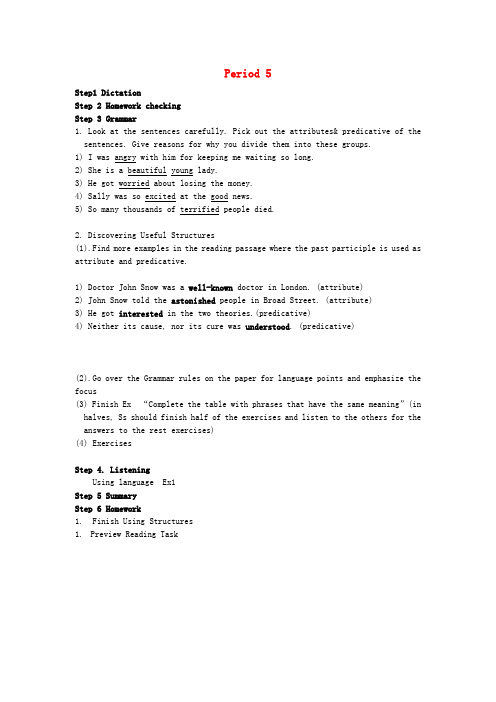
Step1 Dictation Step 2 Homework checking Step 3 Grammar 1. Look at the sentences carefully. Pick out the attributes& predicative of the sentences. Give reasons for why you divide them into these groups. 1) I was angry with him for keeping me waiting so long. 2) She is a beautiful young lady. 3) He got worried about losing the money. 4) Sally was so excited at the good news. 5) So many thousands of terrified people died. 2. Discovering Useful Structures (1).Find more examples in the reading passage where the past participle is used as attribute and predicative. 1) 2) 3) 4) Doctor John Snow was a well-known doctor in London. (attribute) John Snow told the astonished people in Broad Street. (attribute) He got interested in the two theories.(predicative) Neither its cause, nor its cure was understood. (predicative)
- 1、下载文档前请自行甄别文档内容的完整性,平台不提供额外的编辑、内容补充、找答案等附加服务。
- 2、"仅部分预览"的文档,不可在线预览部分如存在完整性等问题,可反馈申请退款(可完整预览的文档不适用该条件!)。
- 3、如文档侵犯您的权益,请联系客服反馈,我们会尽快为您处理(人工客服工作时间:9:00-18:30)。
栏 目 链 接
►Task 1
栏 目 链 接
Having collected observations of the stars and proved the sun isthe centre of the solar system,Copernicus published his theory before dying,which became the base of all the ideas of the universe.(34 words)
栏
目
is cautious about
链
接
enthusiastic about others' affairs
栏 目 链 接
►思维拓展
栏 目 链 接
栏 目 链 接
栏 目 链 接
►即学即练
my offer of help
栏 目
链
接
rejected me
reject the bad ones
◆Parห้องสมุดไป่ตู้ B Retelling
栏 目 链 接
答案:In 1510s, Copernicus' mathematical calculations led to the same conclusion: the earth was not the centre of the solar system.Instead, the centre of the solar system is the sun.As the Christian Church was very powerful at Copernicus' time, he couldn't tell anyone about the theory because it was completely against the powerful Christian's belief.In order to avoid their punishment, he kept his theory until he lay dying in 1543.Now his theory is considered as the basis on which all our ideas of the universe are built.
A1: He was frightened and his mind was confused.
Q2: What would have happened if Copernicus had published his theory immediately?
A2: The pawerful christian church would have punished him.
►Task 2
栏
C
目 链
接
D
栏 目 链 接
栏 目 链 接
答案:C
栏 目 链 接
答案:A
栏 目 链 接
答案:A
栏 目 链 接
◆Part A Role Play
栏 目 链 接
答案:
Q1: How did he feel when he drew the same conclusion over and over again?
栏 目 链 接
栏 目 链 接
►即学即练
lead to
栏
目
链
lead to
seeing
接
you soon
helping poor children
栏 目 链 接
栏 目 链 接
栏 目 链 接
►即学即练
If only I could fly
栏 目
链
接
Only if
can you solve it whether/if it makes sense
make any sense of
There is no sense in
worrying about it now.
栏
目
链
接
became enthusiastic about classical music
栏 目 链 接
►即学即练
became enthusiastic
about classical music
